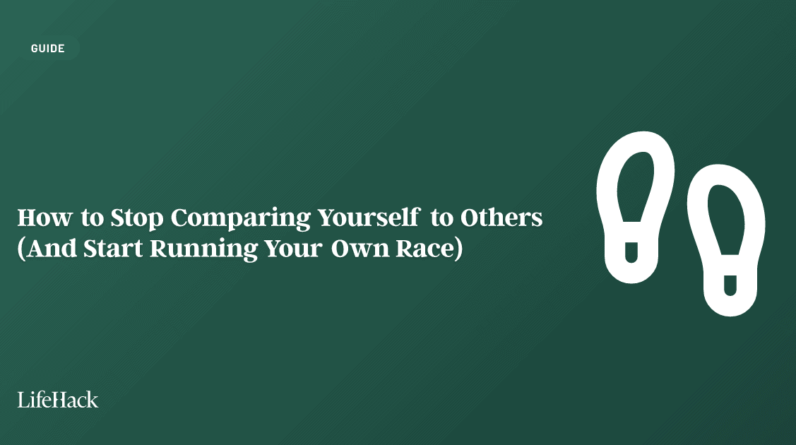
Habits influence all aspects of our lives.
Our existing habits didn’t form overnight, they’re a result of actions repeated over the course of many years.
We do so many things without much thought. And often, we accumulate habits that might not be good for us.
When it comes to habits, start small.
Something as small as the habit of jumping to conclusions or constantly checking your phone can drastically impact your well-being.
Understandably, it’s not easy to focus on healthy habits when you’re faced with unexpected obstacles and difficulties.
Starting small is the key to making long-term changes in life.
When you’re stretched thin, don’t worry about making drastic changes in your lifestyle. Just try to go back to the basics and build habits that contribute to your physical, emotional, and spiritual well-being:
- get enough sleep and physical activity
- make healthier meals
- practice mindfulness
These essential habits will help you find a sense of balance and improve your ability to sustain a healthy lifestyle, even amidst stressful times.
Focus on one area at a time.
Start by practicing awareness around what you do each day, and how you respond to unpleasant thoughts. Pay attention to your triggers, temptations, and other hurdles that prevent you from making healthy choices.
- How can you work around those hurdles?
- How can you make it easier for yourself to choose the healthier option?
For example, if you’re trying to improve your diet, start by removing processed food from your pantry. If you find yourself ruminating often, affirmations can help, or – go back to your reason for changing this habit in the first place.
The 6 Energy-Draining Habits That You Need to Quit Now→
Try habit stacking.
Also, by linking the new habit to a habit you’re already good at, you can make it easier to remember to practice the new behavior. This technique, known as habit stacking – can help you build new habits with more ease.
Identify an action you perform every day, like brushing your teeth, and add a new habit right before or after it.
Pairing one habit with another serves as a sort of automatic reminder and allows you to make the new habit part of your routine.
For example, right after you make your bed each morning, take a two-minute break to write in your gratitude journal so you start the day on a bright note.
Similarly, after you come out of your shower, take a few deep breaths to center yourself. Or you can try cleaning and organizing a part of your room before hopping in the shower.
Be specific about what you want to change.
Let’s say you want to break the habit of comparing yourself to others.
Your goal can be, “I’ll limit my social media usage to 30 minutes per day” or “I’ll write about ten blessings I have in my life”.
Make sure the habits you choose are beginner-friendly. It’s easier to be consistent when the habit is broken down into smaller tasks. The more you successfully complete a task, the better you feel and the more you’re likely to perform it again.
The journey to building better habits won’t always be a smooth one.
Expect obstacles. It’s a matter of when, not if. Obstacles are inevitable. But that doesn’t mean you have to go all or nothing.
Doing something is always better than doing nothing. Instead of getting caught up in a cycle of frustration, focus on getting back on track.
Incorporate beliefs that help you reinforce behaviors which support healthy habits.
Let yourself visualize the rewards of discipline and patience.
Every action, no matter how small can take you towards or further away from your goals. Throughout the day, pause and ask yourself whether you’re moving toward your desired outcome.
Have faith in your ability to make lasting changes. You’ve got this!
Monthly Motivational Message – September: Facing Your Fears→
2023 Throwback – May Motivational Message
Life is complex.
Our thoughts, expectations, other people’s actions, their expectations, work, obligations, and dealing with unexpected events – sometimes it’s all too much to bear.
There’s always something to do. The pace of life is getting faster and faster. We don’t give ourselves enough time to slow down and reflect when we get so busy balancing the demands of life. We end up losing touch with our inner selves.
Living on autopilot prevents us from experiencing true fulfillment in our lives.
It’s so important to create a “toolkit” that comprises the resources you need to navigate life with more ease.
Journaling is one such tool that can help you to get your life back into balance.
Whether you’re going through tough times, contemplating a major decision, working towards a new goal, or feeling lost in life, putting your thoughts on paper can help you gain clarity and figure out the best way to move forward.
2023 May Motivational Message – Journal Every Day
For the month of May, try to journal every day, even if you can only manage to write something like “I can’t think of anything right now.” If you keep writing, it will become easier to get into the groove.
Journaling helps you to organize your thoughts and improve your mental clarity.
Sometimes it feels like your critical inner voice is screaming at you and driving you insane. But once you write down all your thoughts, you will find that the voice has become quiet.
Do a brain dump.
Dumping all your thoughts on paper is very cathartic. It allows you to have a one-on-one with yourself.
Use journaling to gain deep insight into yourself.
- What are your values?
- What actually matters to you?
- What kind of person do you want to be?
Journaling allows you to focus your energy on building a positive mindset.
It gives you the opportunity to get out of your head.
Journaling helps you filter out the noise and brings your attention to the positives in your life. Instead of dwelling on your mistakes, or past events, you focus on figuring out how you can grow and get better.
Release your thoughts.
When you use your journal to process your thoughts and feelings, it becomes an extension of your mind. As you release all the thoughts that bring you down, you create more space for more helpful thoughts and new insights.
You start to think more clearly and feel more present and grounded.
Also, when you work through your feelings, you’re able to effectively communicate your needs to the people in your life.
Give yourself permission to write whatever comes to your mind. Don’t judge yourself. Don’t worry about spelling, grammar, or messy handwriting. Write for yourself.
- Write about your day, no matter how mundane it seems.
- Write a letter to the person who hurt you.
- Write about past events and burn the page down.
- Write about what you’re grateful for, the things that make you happy.
You can choose to re-read what you’ve written. Sometimes, re-reading old entries can trigger painful memories. It’s okay if you choose not to read old entries. It will help you to let things go.
The best part of journaling is that there’s no specific way of doing it. There are no rules. You can vent your heart out, you can scribble random thoughts, doodle, or use journal prompts. It doesn’t matter if you write just a few sentences or five pages.
Just let the words flow.
Photo by August de Richelieu








